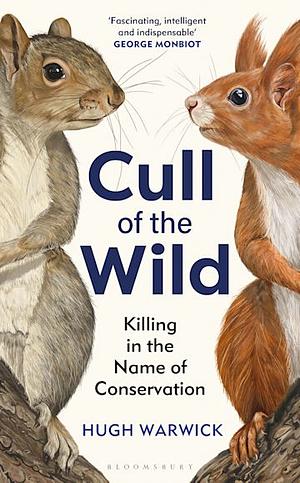
Cull of the Wild: Killing in the Name of Conservation
by Hugh Warwick
Genres: Non-fiction, SciencePages: 304
Rating:

Synopsis:Investigating the ethical and practical challenges of one of the greatest threats to biodiversity: invasive species.
Across the world, invasive species pose a danger to ecosystems. The UN Convention on Biological Diversity ranks them as a major threat to biodiversity on par with habitat loss, climate change and pollution.
Tackling this isn't easy, and no one knows this better than Hugh Warwick, a conservationist who loathes the idea of killing, harming or even eating animals. Yet as an ecologist, he is acutely aware of the need, at times, to kill invasive species whose presence harms the wider environment.
Hugh explores the complex history of species control, revealing the global movement of species and the impacts of their presence. Combining scientific theory with gentle humour in his signature style, he explains the issues conservationists face to control non-native animals and protect native species – including grey and red squirrels on Anglesey, ravens and tortoises in the Mojave Desert, cane toads in Australia and the smooth-billed ani on the Galapagos – and describes cases like Pablo Escobar's cocaine hippos and the Burmese python pet trade.
Taking a balanced and open approach to this emotive subject, Hugh speaks to experts on all sides of the debate. How do we protect endangered native species? Which species do we prioritise? And how do we reckon with the ethics of killing anything in the name of conservation?
Hugh Warwick’s Cull of the Wild is basically a vegan trying to confront the apparent reality that we may have to kill some animals, in great numbers, to protect diversity and preserve populations of endangered animals. Each chapter is a new example, often involving travel and dialogue, and he does his best to write openly about his biases and where he’s coming from.
It was interesting, mostly, but it did kind of drag once the examples started being very similar, because the dilemma is mostly the same in each case. For that reason I found the start of the book best, and by the end the conclusions mostly seemed obvious.
Personally, I’m somewhat ambivalent on the subject: I’d say I basically expect that it’s a case-by-case thing, for me, because some culls seem plausible and likely to both work and help, while others… the species aren’t necessarily surviving even if the predator/competitor pressure is removed, because humans are actually the major problem for many/most species in many/most parts of the world. Sometimes I don’t think killing an invasive species is the solution, because we can’t actually turn back the clock. And sometimes the invasion is new or partial in a way that makes a cull or a killing perimeter or whatever work, but it’s expensive, and then you wonder whether it’s worth it.
I don’t disagree that it’s the fault of humans, to be clear, nor that we bear a responsibility to fix things. These things are true. But killing to save is not going to be a good solution for everything, and I think I come at that answer from a slightly different direction with Warwick, who is largely concerned with a utilitarian weighing-up of suffering against suffering, and finding the greater good. That was maybe a bit frustrating to me, because the “maybe sometimes we should just… leave it alone” viewpoint is rather lacking.
Rating: 4/5
